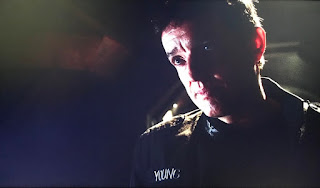-Commander William Adama-



With the beleaguered remnants of humanity on the run following the fall of Caprica, the pressures to survive mounts. Humanity labors in who to trust making efforts to distinguish between humans and Cylon sleeper agents. Compounding those issues are the harsh realities of rationing the basic necessities of sustenance and resources in space. Moore's warship carrier the Galactica is indeed in a crisis situation as the series moves forward.

Battlestar Galactica, Season One, Episode 2, Water sees the Galactica making efforts to share its water recycling system with other ships within the fleet when the tanks are unexpectedly ignited by a saboteur. Was it a Cylon? A Cylon sympathizer? A human traitor? Moore would challenge our perceptions throughout the series.

In science fiction, humanity always battles the odds when it comes to resources in the new frontier of space. With BSG not only was the Galactica facing a shortage of water, that shortage is compounded and made worse by sabotage and detonation of existing tanks upping the dramatic ante.
Water and resource issues plague space stations and New Terra in the series The Expanse (2015-present).

Stargate Universe (2009-2011) endured its own resource issues includiing a water shortage aboard the Destiny in a first season episode of its own also called Water. In these aforementioned entries in sci-fi all are excellent and handled with nail-biting credibility within the genre.

Battlestar Galactica's Water is particularly gripping as the fleet's inhabitants must ration and fight a two-prong war against the Cylons and/or thirst and starvation. You'll recall similiar dire days in Saga Of A Star World from the original Battlestar Galactica (1978-1979. Have you seen grocery stores the world over during the Coronavirus pandemic of late?

Battlestar Galactica makes for a thrilling exercise in survival with its Water entry into the resource story book of science fiction.

Despite these fairly straightforward storylines in the first two episodes, what is most fascinating is every small, interpersonal interaction on board the Galactica. Every episode digs deeper into character and the complexity of human behavior, the responses to circumstances as well as the environment and politics.

The triangle of William Adama, Laura Roslin and Lee Adama is established with an almost natural maternal leaning for Lee toward Roslin. Kara "Starbuck" Thrace and Gaius Baltar are introduced to one another. Number Six and Baltar continue to intrigue psychologically. Motivations by all involved are complex, credible, natural and evolve with great intricacy throughout the series.

Additionally, through Sharon Boomer Valerii the writers present inner human struggle within the Cylons that would become part of the series. Boomer clearly is tortured between a Cylon mission and her realization of self-determination and free will and what it means to be a human.

This is what makes this new Battlestar Galactica such a riveting experience---believable crisis in character and events aplenty.

Writer: Ronald D. Moore. Director: Marita Grabiak.

























































